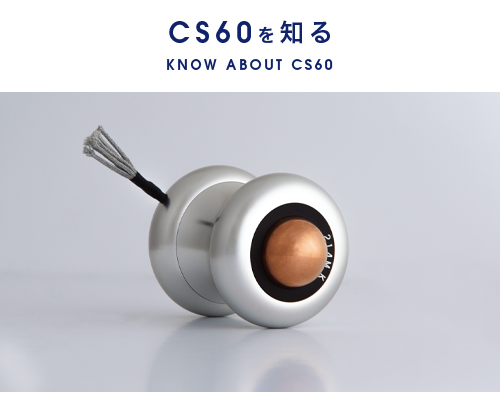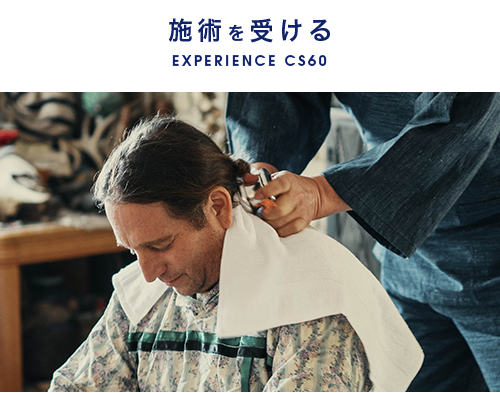
- 2019/10/17
-
Newsletter Vol.28
パーツではなく全体をいやす
Healing the Whole, not the Parts
Soigner l’ensemble, pas des parties  今回は青山のCS60本部で、開発者・西村光久さんに近況をうかがいました。
今回は青山のCS60本部で、開発者・西村光久さんに近況をうかがいました。
さまざまなケースに対応してきた西村さんに、CS60の可能性について質問します。
――――――――――――――――――――――――――先日、知人が人工肛門になってしまいました。
CS60ではそういった人も対応できるんですか?西村:うーん。
もうお腹に穴をあけて人工肛門を開設しているわけだよね。
人工的なものをつけてしまったら難しいかもしれないね。
できればそうなる前に来てほしいな。―そうですか。
西村:今の医療自体、根本的に間違えているところがいっぱいあって、パーツしか見ていないんですよ。
去年、人工心臓をつけた患者さんがいらっしゃいました。
心臓移植のため、ドナーの順番待ちですが、彼の前に200人くらいいて、5年はかかるだろうと言われていました。
彼自身は半信半疑ですが、知り合いに無理やりここに連れて来られたのです。―心臓を施術されたんですか?
西村:いや、僕は「これは心臓が悪いんじゃなくて、ポンプ機能が衰えているから血流の戻りが悪いんだ」と思って脚を集中的にしたんです。
施術を10回ぐらい終えた後に、彼が人工心臓のオーバーホールで入院しました。―オーバーホールって何ですか?
西村:人工心臓を外して、ちゃんと動いているかどうか、バッテリーが切れていないかをメンテナンスするんだけど。
人工心臓を外したら、彼の心臓が普通に動いていたの。
病院側は1か月間様子を見たんだけど、その後も問題なく動いていたから、結局人工心臓を外したんです。―そうですか。もう手術はいらないんですか?
西村:そうです。
この人は、それまでの2年間で膨大な医療費がかかっているんです。
人工心臓をつけたりメンテナンスしたりする費用で、その先まだまだ膨大な費用がかかる予定でした。
それはみんな税金から払われているんです。
健康保健には、上限を超えたら還付される高額療養費制度があるので、みんな安心して受けられるんですけど。―それを続けていると、医療制度が破綻しそうですね。
西村:そうなんです。
みんな全体的な視野で見ることができず、自分の専門分野だけで判断してしまうのが問題です。―以前内科の先生に話を聞いときに、「リュウマチの原因が、根っこを抜いた歯の炎症にあった」と言っていたことがあります。
まさか関節痛の原因が歯にあるとは思いませんよね。西村:そう。だからパーツだけではなく全体を見る必要があるんです。
(おわり)This time we’re catching up with developer Mitsuhisa Nishimura at CS60 HQ. We ask Mr. Nishimura, who has handled a wide array of cases, about the range of possibilities the CS60 has.―――――――――――――――――――――――――
– A person I knew had a colostomy the other day.
Can the CS60 help people like that too?Nishimura: Well… So, this person already had a hole made and a colostomy bag fitted, right? There’s not all that much we can do once something artificial has already been attached to the body. Ideally, we would want you to come to us before it gets to that stage.
– Is that so?
Nishimura: Modern medicine contains a lot of things that are fundamentally mistaken. It just looks at the parts of a person, and not the whole.
Last year, we had a patient who had had an artificial heart fitted. He was waiting for a heart transplant donor, but there were about 200 people ahead of him in the line, and it was going to take about five years apparently.
He himself was skeptical, but someone he knew dragged him to us.You performed treatment on his heart?
Nishimura: No. I actually thought that the problem wasn’t his heart, it was that the pump function had degraded and so his circulation was bad. I actually focused on his legs. After about ten treatments, he ended up going to hospital for an overhaul of his heart.
– What’s an overhaul?
Nishimura: So, what they do is they take the heart out to do maintenance on it. You know, check it’s working properly, make sure the battery isn’t running out and so on.
But when they took out the artificial heart, they noticed his heart was working normally. The hospital monitored him for a month, but in the end, since it was working without a problem, they removed the artificial heart altogether.– Is that so? So, he didn’t need surgery at all after that?
Nishimura: That’s right. But that guy, up until then, had incurred extreme medical costs in the two years prior. With the maintenance on the artificial heart and all, he had even more extreme costs to look forward to.
All of us are paying for that in taxes. Of course, there is a system for provisioning high-end medical care at low cost in Japan once you go over a certain amount under the health insurance system, so people can get treatment without worrying about it.– If that goes on like that the health care system will go bankrupt, won’t it?
Nishimura: That’s right. The problem is that nobody looks at the whole, and instead just focuses in on their one area of specialization.
– I once spoke to an internal medicine doctor who told me that the cause of rheumatism was inflammation from when patients had had teeth pulled out at the root. You wouldn’t think that joint pain could be caused by something to do with the teeth!
Nishimura: That’s right. That’s why you have to look at the whole and not just the parts.
(End)Nous avons interviewé Monsieur Hisamitsu Nishimura, le développeur du CS60, au siège à Aoyama.
Nous lui avons posé des questions concernant le CS60, Monsieur Nishimura ayant déjà lui-même été amené à soigner divers patients. ―――――――――――――――――――――――――– Un ami à moi vient d’avoir une stomie.
Le CS60 peut-il soigner ce type de gens ?Nishimura : Mmm.
Vous voulez dire qu’il a déjà un trou sur son ventre dans le but de réaliser une stomie.
C’est peut-être difficile à soigner si un objet artificiel a déjà été placé.
Si c’est possible, je vous conseille de venir avant que cela ne se fasse.– D’accord.
Nishimura : La médecine d’aujourd’hui fait beaucoup d’erreurs de base. Elle n’observe que les parties.
L’année dernière, un patient ayant un cœur artificiel est venu pour les soins.
Il est sur liste d’attente pour une transplantation cardiaque mais il y a environ 200 personnes devant lui et il semble qu’il faut attendre au moins 5 ans pour que la chirurgie soit faite.
Un ami à lui l’a forcé à venir chez moi bien qu’il doutât de l’effet du CS60.– Avez-vous soigné son cœur alors ?
Nishimura : Non. Pour moi il n’y avait pas de problème au niveau du cœur, le problème venait d’une pompe qui fonctionnait mal, ce qui rendait compliquée la circulation sanguine. J’ai donc frotté principalement ses jambes avec le CS60.
Après environ 10 sessions de soins, il a été hospitalisé en raison d’un « overhaul » du cœur artificiel.– Qu’est-ce qu’un « overhaul » ?
Nishimura : On enlève régulièrement le cœur artificiel pour vérifier qu’il fonctionne bien et que la batterie n’est pas morte. Lorsqu’on a enlevé son cœur artificiel, son cœur a fonctionné normalement.
Le médecin l’a donc laissé sans cœur artificiel pendant un mois pour voir si c’était possible. Son cœur fonctionnait sans aucun problème alors on a finalement enlevé complètement le cœur artificiel.– Je vois. Il n’a plus besoin de chirurgie donc ?
Nishimura : Non.
Il a fallu beaucoup d’argent pendant deux ans pour les soins médicaux. Encore beaucoup d’argent aurait dû être dépensé pour installer ou encore entretenir le cœur artificiel.
Tout cela est financé par les impôts.
Il est vrai que comme la sécurité sociale couvre les dépenses au-delà d’une certaine limite, nous pouvons recevoir des soins médicaux sans aucun souci.– Mais si on continue comme ça, le système médical japonais va s’écrouler.
Nishimura : Oui.
Le problème, c’est que tout le monde juge uniquement à partir des connaissances de son propre domaine et qu’il ne peut pas avoir une vue d’ensemble.– Lorsque j’ai parlé avec un médecin généraliste, il a dit qu’un rhumatisme avait été causé par l’inflammation d’une dent dont la racine a été arrachée.
On ne pense jamais que la cause du rhumatisme se trouve dans les dents.Nishimura : Oui. C’est pourquoi il faut examiner non seulement les parties mais aussi l’ensemble.
(fin)
INDEX
















